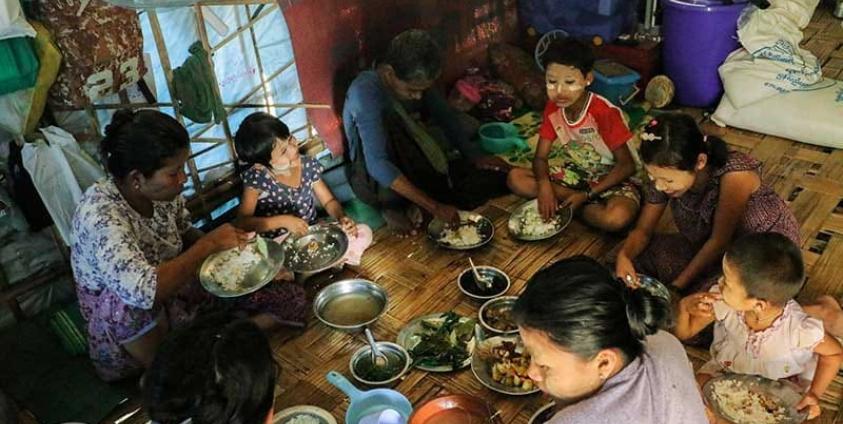More than 2,000 internally displaced people (IDPs) taking shelter in Minbya town returned to their homes on Thursday after the regime gave them 500,000 kyats per household and told them to return home.
Junta officials provided 500,000 kyats per household plus one month of food supplies and instructed the IDPs to return to their homes, saying peace and stability had been restored, said Ma Zin Mar Nwe from Hparpyo Village, who was taking shelter at the Nayan displacement camp.
“They said they would not let IDPs stay at the camps, and that all must return home. So, we did,” she told DMG.
Military officials, along with staff from the General Administration Department and Disaster Management Department, summoned IDPs to Yar Maung Hall, and told them to return home, but some refused for fear of landmine risks and the presence of junta troops near their villages.
“They told us to return home, but we can’t because they have not cleared the mines,” said an IDP from Thalu Chaung Village who is taking shelter at the Wartaung displacement camp in Minbya. “And what are we supposed to do with just 500,000 kyats? They must clear landmines if they want us to return home. And there is no guarantee that fighting will not happen again.”
Junta-controlled newspapers reported that the Disaster Management Department also provided a relocation fee of 100,000 kyats and 17 types of consumer goods per household to 588 returning households.
Recently, junta-appointed ministers including social welfare minister Dr. Thet Thet Khaing, international cooperation minister U Ko Ko Hlaing, and Arakan State chief minister U Htein Lin visited displacement camps in Kyauktaw, Mrauk-U and Minbya townships and reportedly pressured them to return home.
The regime also forced IDPs back to Abaungthar Village in Chin State’s Paletwa Township in late December, and the returnees are having livelihood difficulties.
The total number of IDPs in Arakan State, including those who remain at displacement camps due to 2018-2020 fighting between the military and Arakan Army, stood at about 90,000 early this year, according to a January 11 report from the United Nations Office for the Coordination of Humanitarian Affairs (UNOCHA).








